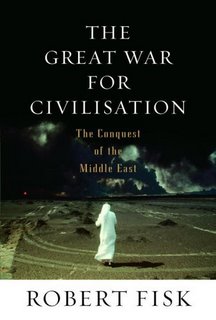 Robert Fisk has been a Middle East correspondent for the last 30 years, reporting on all the key conflicts from the region. The marvellous and original thing about this 1300 page tome is the fact that he has been everywhere and met everyone. So many commentators on politics have this ‘far away’ feel; they solemnly and seriously discuss people and events. Fisk’s narrative breathes with real people, describing their human follies at first hand. For example, he describes Yassir Arafat at one stage holding a microphone ‘like a crooner’.
Robert Fisk has been a Middle East correspondent for the last 30 years, reporting on all the key conflicts from the region. The marvellous and original thing about this 1300 page tome is the fact that he has been everywhere and met everyone. So many commentators on politics have this ‘far away’ feel; they solemnly and seriously discuss people and events. Fisk’s narrative breathes with real people, describing their human follies at first hand. For example, he describes Yassir Arafat at one stage holding a microphone ‘like a crooner’.Despite the fact that Fisk is describing so much human misery and carnage, he manages to much of the time keep a pretty cheery tone. At one stage in the book the author almost reminded me of Shakespeare’s Falstaff, picking his away amongst the corpses of the battle field, making jests all the while. He’s met so many of these politicians and dignitaries up close, that he can describe high level meetings between eminent statesmen like a family squabble. This is very refreshing. Fisk strips back all the pomp and circumstance to show us real politics and personalities at work, the little fascinating details versus the official ‘story’ of history.
The book opens with Fisk meeting Osama bin Ladin – this alone gives you an idea of the kinds of people he has met. The ensuing 1300 pages follows 30 years of war and misery in the Middle East. At the end of the book Fisk says his book was not inspired by September 11, that he had intended to write a long history of the Middle East for quite a while. The aim of the book is to show how important it is that we don’t forget history – otherwise, as the saying goes, we are doomed to repeat it. The end of the book is pretty pessimistic actually. Fisk says that our wars will go on and on because we will not learn anything.
This is a truly marvellous book. Let’s leave aside his political views, which many would describe as, perhaps, ‘hard left’. Many will disagree with his view that Western policies towards the Middle East have been ‘promiscuous’, and have consequently led to our current terrorist problems. The sheer first hand detail and reportage of this book makes it an absolute must for people from all sides of the debate. He has just talked to absolutely everyone – politicians, civilians, victims. He has seen enough horrors for a lifetime – frankly, I don’t know how he hasn’t gone mad himself.
The book also mixes history and reportage with a good dose of autobiography. His cantankerous father died recently in his mid nineties. Bill Fisk (the author’s father) gave him one of his medals from the Great War. On it is engraved ‘The Great War For Civilisation’. Hence the title of the book. Fisk weaves in the story of his father’s war time service into the larger narrative of Middle East history. The sections on his parents fairly miserable marriage I found truly absorbing. (His mother, Peggy, had her husband Bill admitted to an old people's home and refused to ever see him again! She didn’t even go to his funeral. How do people live such miserable lives for so long?)
If you are studying journalism, I can think of no better book to buy. Robert Fisk is a great example of the tradition of first hand reportage. His commitment to getting the story, immersing himself, is truly inspiring. He doesn’t just report the political end, but also interviews the people whose lives are ripped apart and destroyed by the bombs and bullets.
If you are studying Middle Eastern history, this book is a must too. I can’t think of anywhere else where you will get the following kind of detail and perspective: Fisk describes meeting Saddam Hussein and says how his hand was clammy and wet. Discussing this with another journalist who’d met Stalin (Saddam’s hero), this journalist said that Stalin had a clammy hand as well.
No comments:
Post a Comment